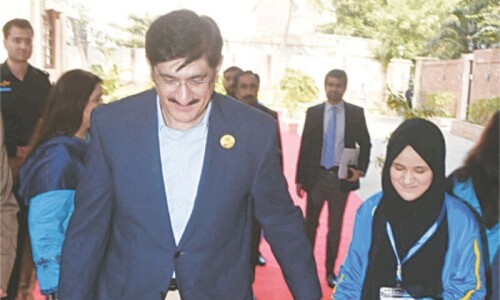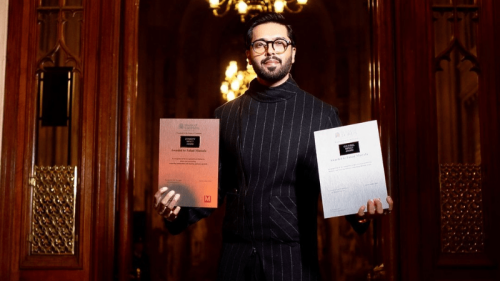
THOMAS Roebuck compiled ‘An English and Hindoostanee naval dictionary of technical terms and sea phrases’. First published in 1811 from Calcutta (now Kolkata), it was Urdu’s first dictionary of technical terms, as Hindustani (with variant spellings) was one of the myriad names given to Urdu.
But it included common Urdu words and phrases, too, and the basic purpose of writing this dictionary was to help the officers of East India Company who worked on ships and needed to command the native Indians.
Later, some institutions and individuals — such as Delhi College, Rai Sohan Lal, Syed Hussain Bilgrami, Deccan’s Usmania University, Anjuman Taraqqi-i-Urdu, Karachi University, Majlis-i-Daftari Punjab, Urdu Science Board, Punjab University and National Language Authority — worked on coining the Urdu terminology and compiled thousands of Urdu equivalents of modern technical and scientific terms and presented them in, this goes without any exaggeration, hundreds of dictionaries. Dr Atash Durrani and Dr Abul Lais Siddiqi have compiled bibliographies of such works and the number goes well beyond 500.
As for literary terms, Urdu’s general dictionaries and technical books written on prosody, grammar and rhetoric served the purpose. Some works on Urdu prosody, such as Najm-ul- Ghani Rampuri’s Behr-ul-fasahat (1885) and Mirza Muhammad Askari’s Aaina-i-balaghat (1937), explained many other terms too in between explaining the prosodic and grammatical matters. Askari also appended an Urdu-English index of literary terms.
Captain G. D. Pybus, an officer in British India army, wrote a book on Urdu prosody in English and gave examples in Urdu script wherever necessary. The book includes a list of terms in Urdu script at the end. Titled A textbook of Urdu prosody and rhetoric, it was published from Lahore in 1924.
But it took quite long to compile an Urdu dictionary devoted entirely for literary terms. Let us have a quick look at Urdu dictionaries of literary terms before we discuss a new arrival.
Shear-o-qaafia (1952)
Compiled by Soofi Varsi Meeruthi, it is not a dictionary of literary terms in real sense, but it carries a chapter on terms used in poetry and poetics. It was reprinted from Lahore in 1991 by Maktaba-i-Aaliya.
Rumooz-i-shear-o-sukhan (1965)
According to Dr Atash Durrani, it was compiled by Sheikh Rafiuddin Ahmed Rafi.
Istelahaat-i-drama (1984)
Compiled by Dr Muhammad Aslam Qureshi and published by the National Language Authority, Islamabad, it explains the terms related to drama and its criticism.
Kashshaaf-i-tanqeedi istelahaat (1985)
Compiled by Abul Ejaz Hafeez Siddiqi and published by the National Language Authority, Islamabad, it is an Urdu-Urdu dictionary of literary terms. Though its scope is not too vast, it amply explains certain literary terms with quotations from original works, necessary references and bibliography. A brief English-Urdu glossary of terms at the back of the book makes it more useful.
Farhang-i-adabi istelahaat (1986)
Prof Kaleemuddin Ahmed, a well-known scholar of Urdu from India, compiled it and it was published by Bureau for Promotion of Urdu, Delhi.
Prof Ahmed had profoundly studied western literatures and the book contains many modern literary terms that were new to Urdu at that time. He not only explained them quite well but also coined new Urdu terms and gave quotations from master pieces of English literature, thereby making it a unique work. It is basically an English-Urdu dictionary of literary terms and explains the terms at length.
Adabi istelahaat (1993)
A popular work that has recently been reprinted for the fourth time by the National Book Foundation, it is intended for students. Written by Prof Anwer Jamal, the book gives English equivalents while explaining Urdu terms in Urdu.
Farhang-i-istelahaat-i-uloom-i-adabi (1996)
A scholarly work by Dr Sajidullah Tafheemi, the book concentrates more on prosodic and grammatical terms rather than literary ones. Iran-Pakistan Institute of Persian Studies, Islamabad, published it.
Muntakhab adabi istelahaat (2005)
A commendable work explaining in detail the modern literary terms in Urdu with English equivalents, it is compiled by such renowned literary figures as Muhammad Saleem-ur-Rahman and Suhail Ahmed Khan. Lahore’s G.C. University published it.
Tanqeedi istelahaat (2011)
Another good job done by another well-known literary figure, the book published by Sang-i-Meel and compiled by Dr Saleem AKhter explains in detail a large number of old and new literary terms.
Adabi istelahaat (2018)
Dr Haroon-ur-Rasheed Tabassum taught at Government Ambala Muslim College, Sargodha. He is a prolific writer and has compiled and written about 100 books.
This prolificacy must take its toll as is evident from his latest work, published by the Book Corner, Jehlum. Though the book may be helpful for students, it would have been more so had the literary terms listed been in alphabetic order. Also, no proper references are given and a list of works cited is missing altogether.
One feels that keeping in view the long history, as discussed above, any new book on literary terms needs to be more comprehensive and more authentic rather than being just a commercial venture.
Published in Dawn, August 6th, 2018













































Dear visitor, the comments section is undergoing an overhaul and will return soon.